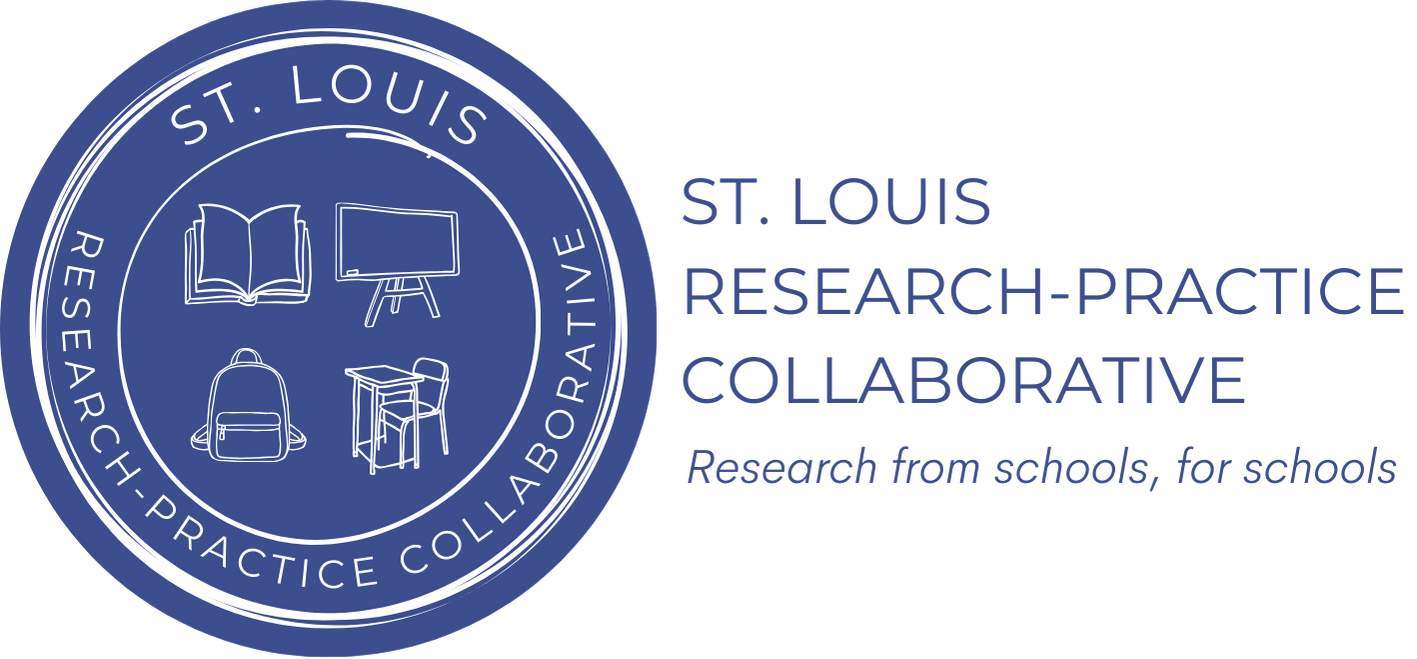Developing the RPP
During the beginning of the COVID pandemic, July 2020, a group of educators and university deans and researchers began meeting via zoom to imagine how a practitioner-led research-practice partnership (RPP) could be structured in St. Louis. Using a collaborative design process facilitated by SKIP Designed, a pilot RPP called the STL School Research-Practice Collaborative (SRPC) was formed. The SPRC is currently an independent research-practice partnership that brings multiple universities, industry researchers, school practitioners, and community leaders together to conduct mutually beneficial research that will foster improvements for students in STL schools.
The RPP was developed over the course of three discrete stages and over two years of conversations, development, and design.
-
From July to December 2020, members of SKIP, St. Louis Public Schools, and Washington University in St. Louis met to start the process of developing a research practice partnership in St. Louis. The goals of these meetings were to:
Discuss the feasibility of creating a research-practice partnership in St. Louis, including any potential barriers to collaboration
Develop an initial proposal for the research-practice partnership
Identify potential partners for the Design Phase
Explore institutional buy-in
In December 2020, the working group started meeting one-on-one with leaders from universities, schools, and community organizations to get feedback on the proposed structure for a research practice partnership and to invite them to engage in the next phase as members of the Design Council.
Members of this working group were Jay Hartman, Vicki May, Abbey Loehr, Maia Elkana, Deanna Childress, Saras Chung, Ellen O’Neill, and Rachel Matsumoto.
-
The Design Council launched as a time-limited working group whose purpose was to advise and develop the mission and design for the initial structure of the St. Louis Research Practice Collaborative (SRPC). It met monthly from January to June 2021 for a total of 5 meetings.
Phase 1a-Vision Setting
January 2021: the Design Council met to set the vision for the SRPC, identify potential challenges, and decide on the geographical scope of the work.
They discussed how school data was currently overwhelming, hard-to-find, siloed, weaponized, and disconnected and identified a goal to make school data more user-friendly, accessible, and useful for practitioners in decision-making.
The Design Council also identified key challenges to launching SRPC:
Ensuring school practitioner interests are centered in the development of research questions and corresponding activities
Moving multiple institutions with different incentive structures
Creating an organizational structure to meet practitioner and researcher needs and fostering even contribution
Building trust between sectors
The group decided that SRPC would initially focus on charter and district schools within St. Louis City, with the potential long-term goal of expanding to the St. Louis region as a whole.
Phase 1b-Designing the Experience
From February to June 2021, the Design Council developed the governance structure, pilot research agenda, initial engagement pathways for practitioners, and data hub through subcommittees. Subcommittees proposed work back to the overall Design Council for approval. By the end of this process, SRPC has:
Created and approved a pilot research agenda for the first research projects
Committed to clear and robust decision-making structures that align with the needs and incentives of all parties at the table
Developed a plan for data hub development over the following years
Designed initial user-centered pathways for practitioners to engage with research that will be incorporated into the first research projects.
Additional stakeholders beyond the Design Council members were included in some subcommittees due to their subject expertise.
Check out the notes and decisions from all Design Council meetings here or read a detailed overview of the timeline and development here.
-
Phase 2 began in August 2021 and will span until June 2022. The Design Council was dissolved and those that wished to commit to the SRPC are in the process of formalizing their partnership. A steering committee of volunteers continues to guide this work.
During this phase, the SPRC is pursuing work to conduct the first research project. Steering committee members continue to design and develop a potential infrastructure for the long-term sustainability of the SRPC.
This phase seeks to achieve the following goals:
Formalize partnerships to carry out the initial research agenda through MOUs.
Secure diverse sources of funding to sustain the work outlined in the research agenda
Execute the research agenda
Work with practitioners to incorporate research results into educational practices for testing and monitoring
Evaluating for success through periodic project check-ins
Continued work toward the development of SPRC infrastructure
Check out the first research project on student mobility in St. Louis here.

